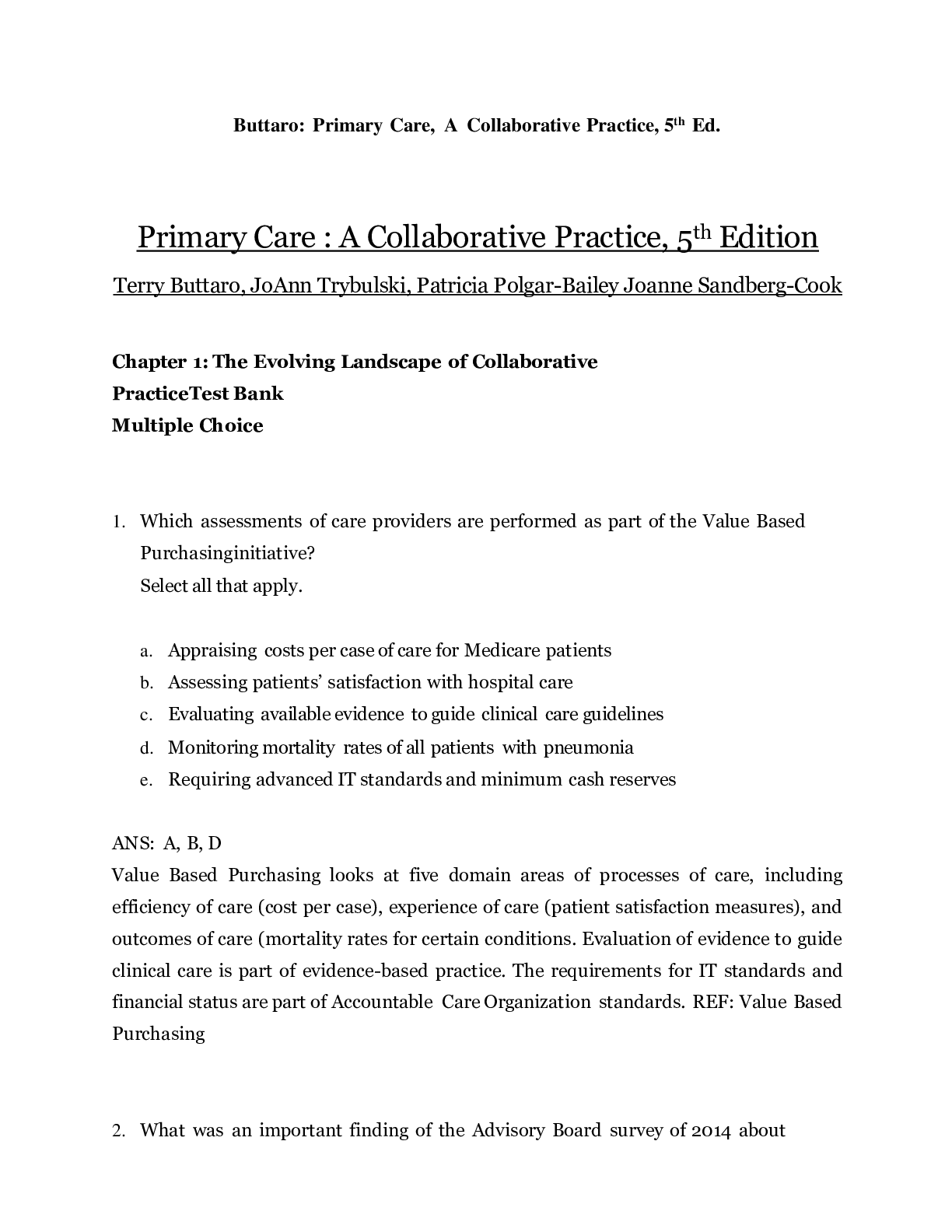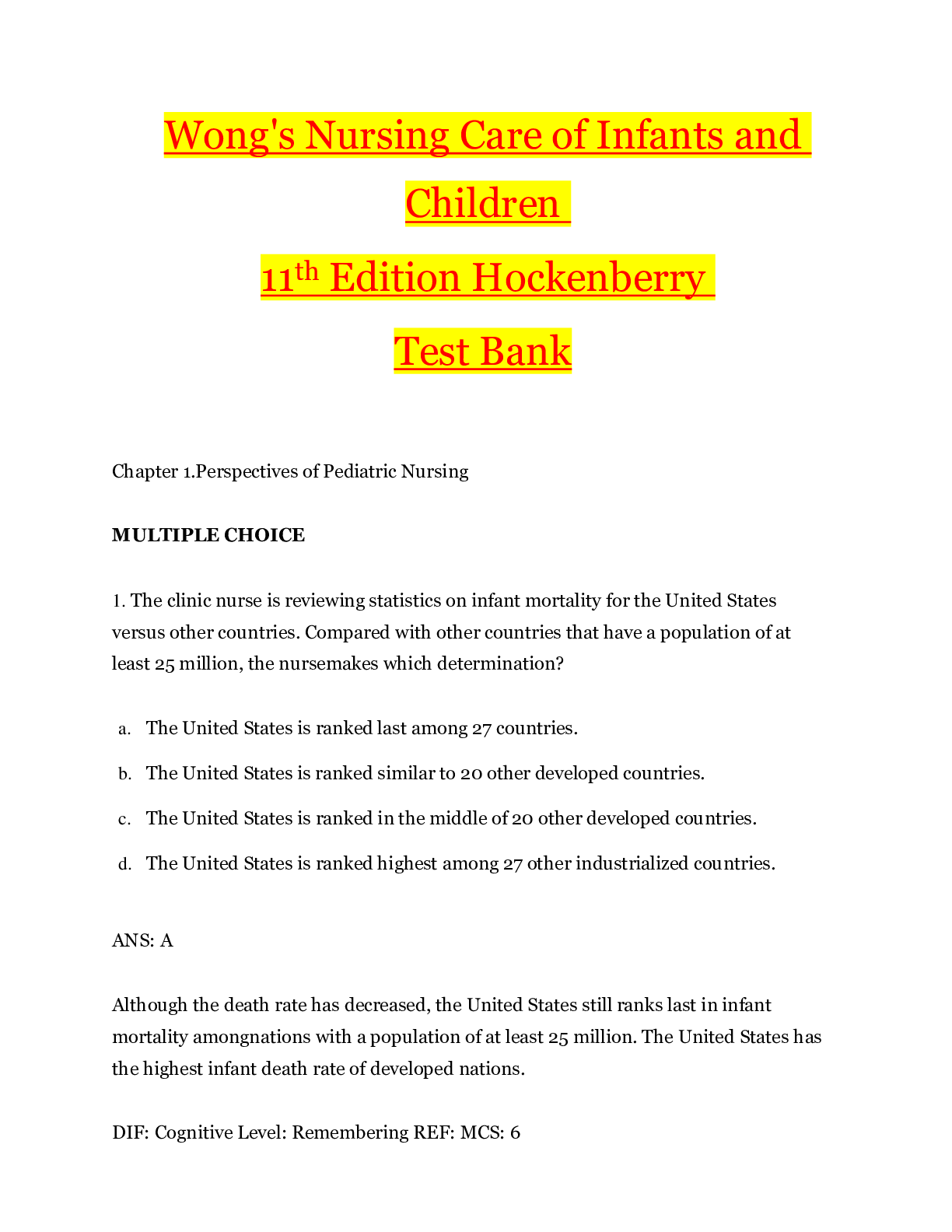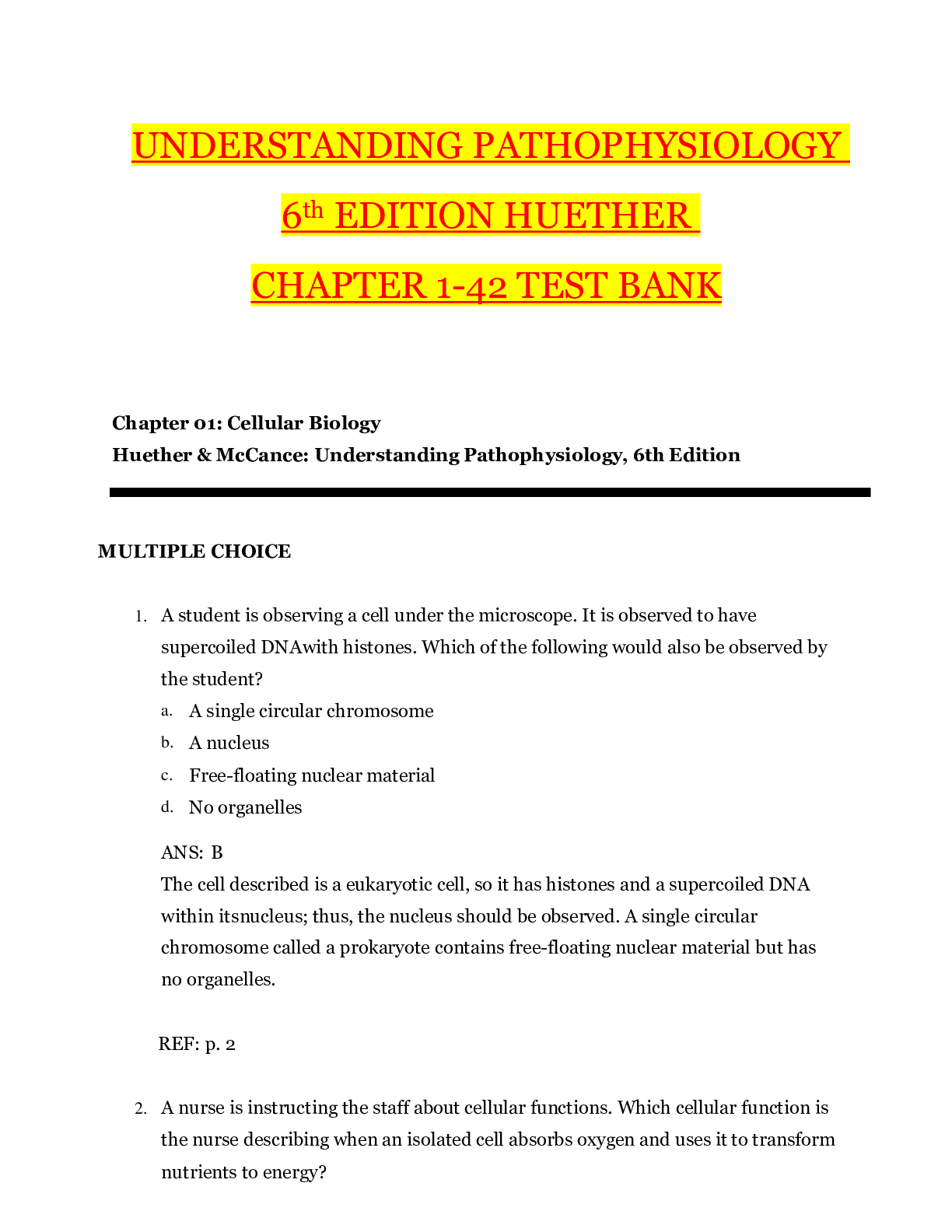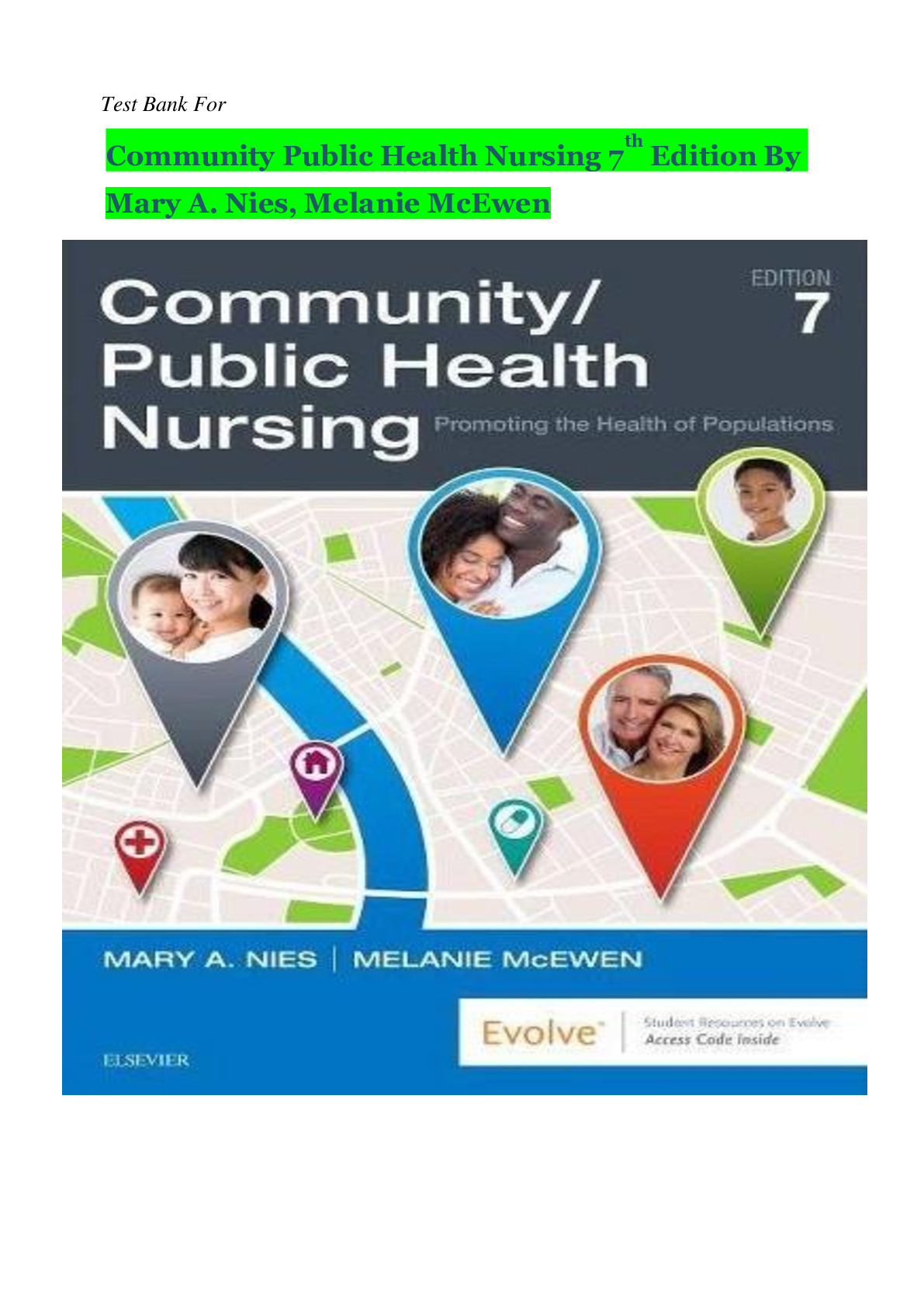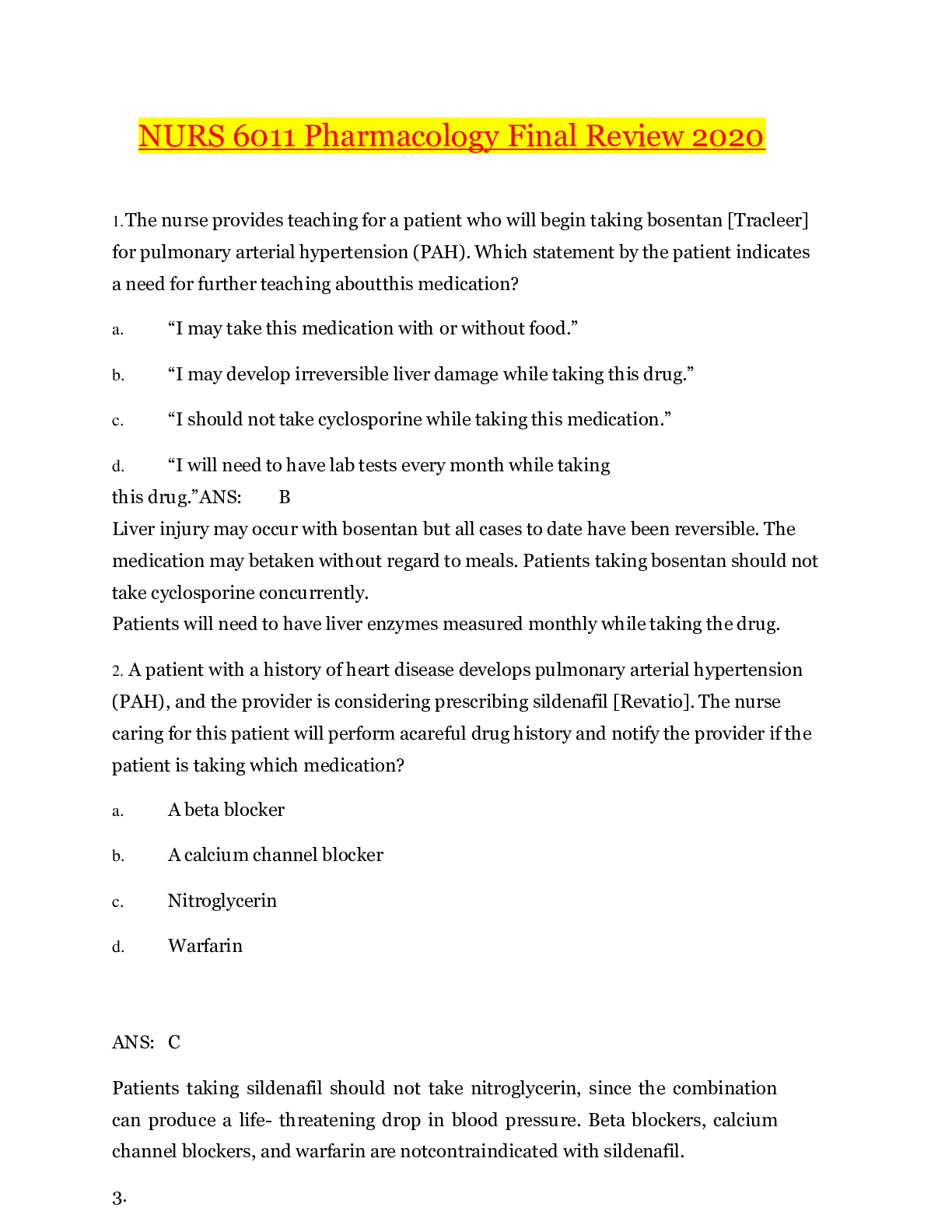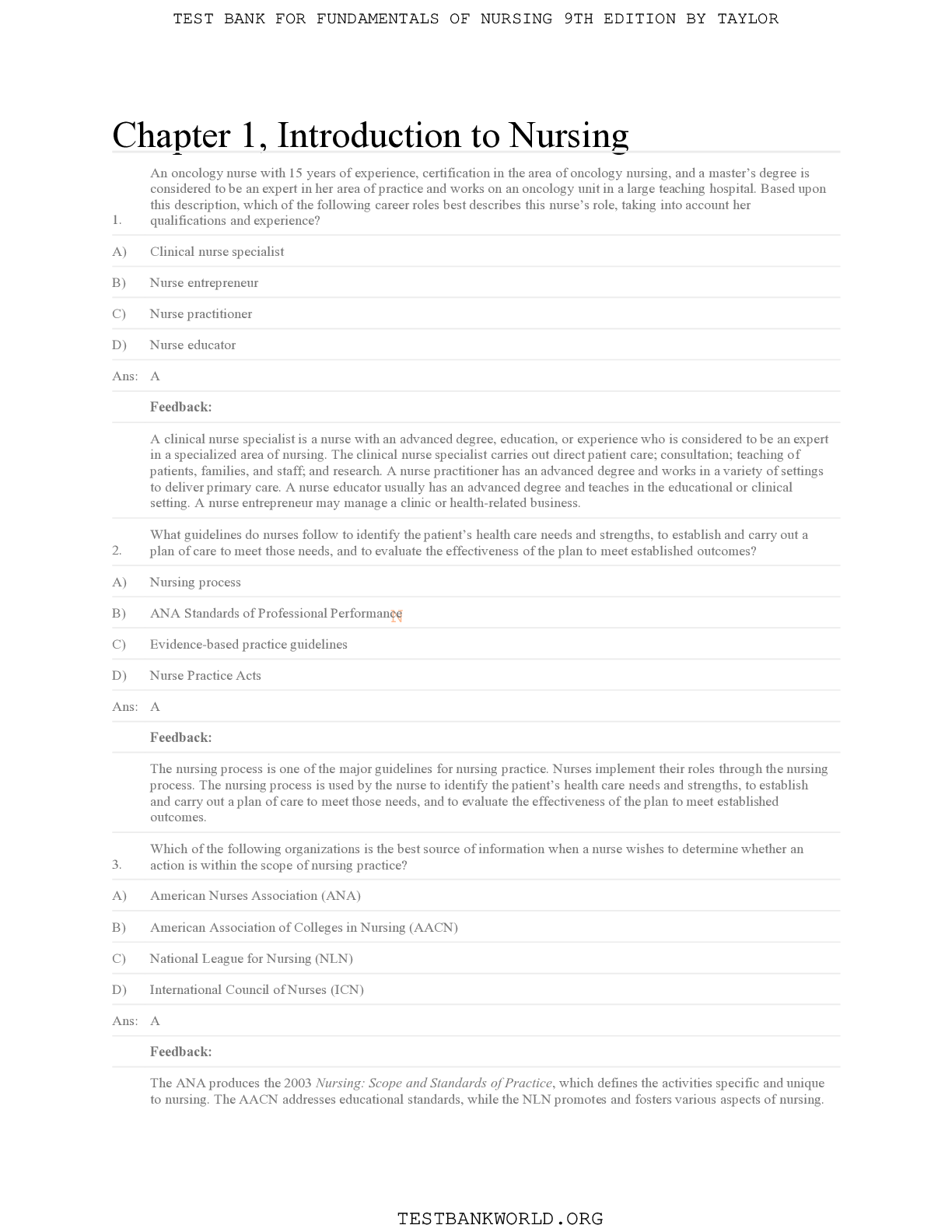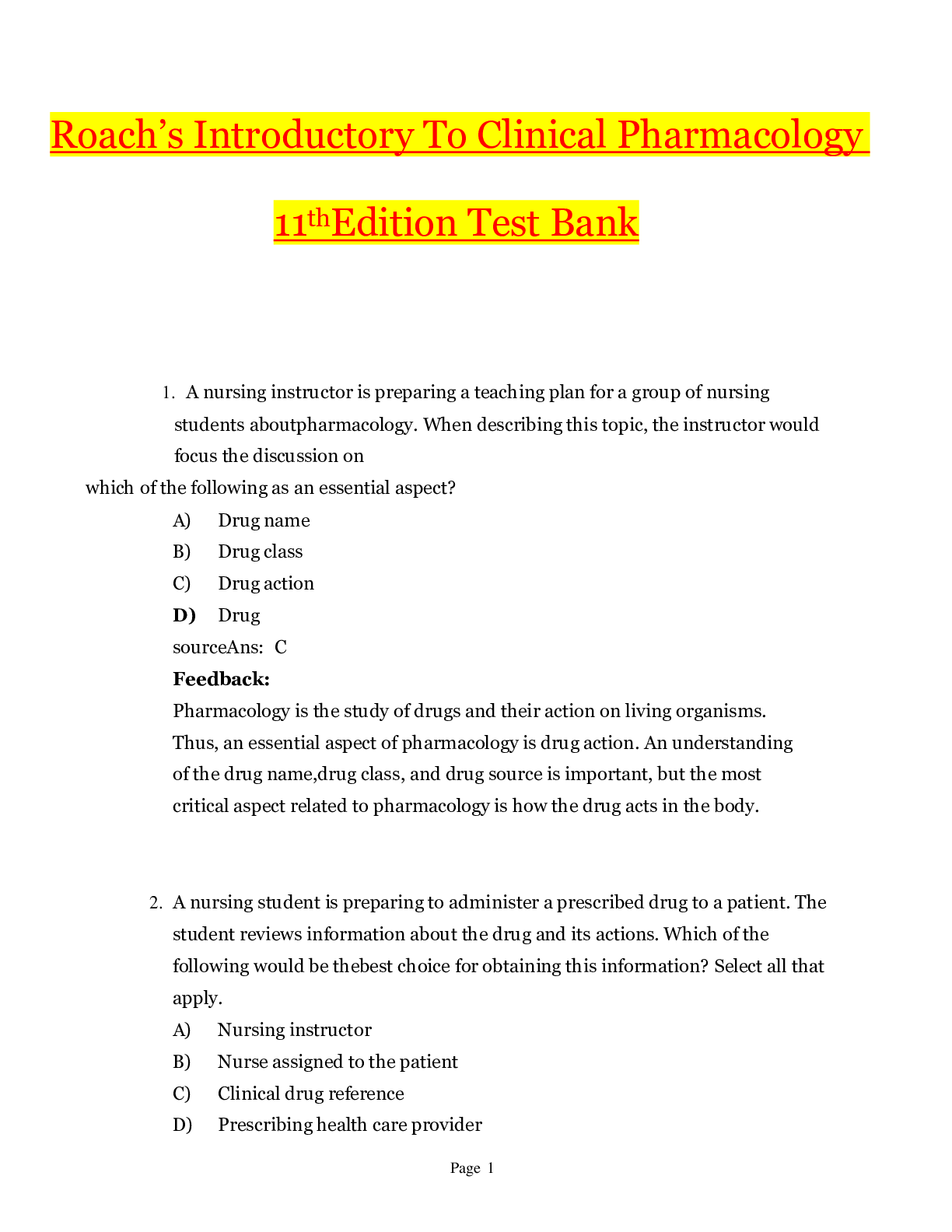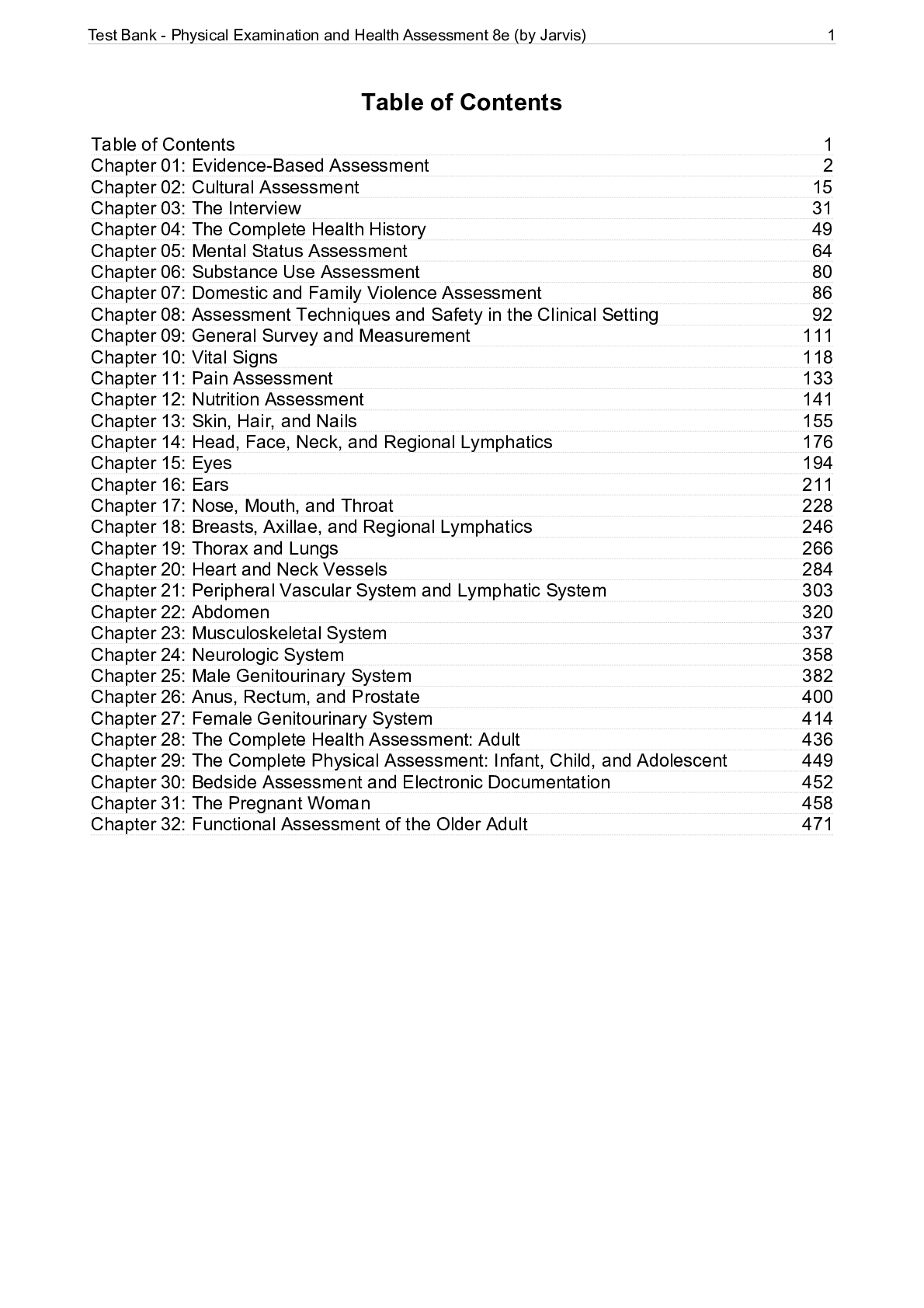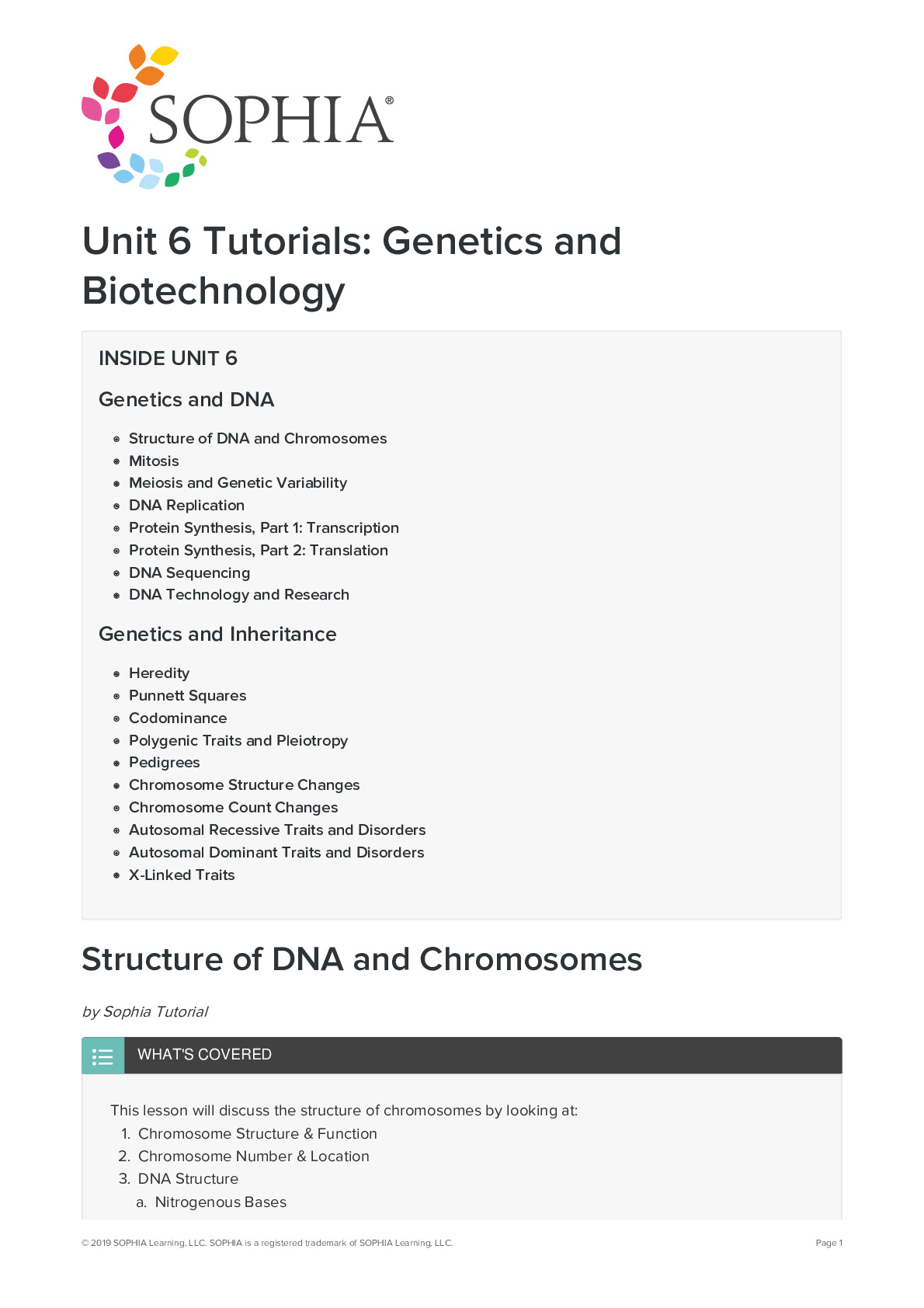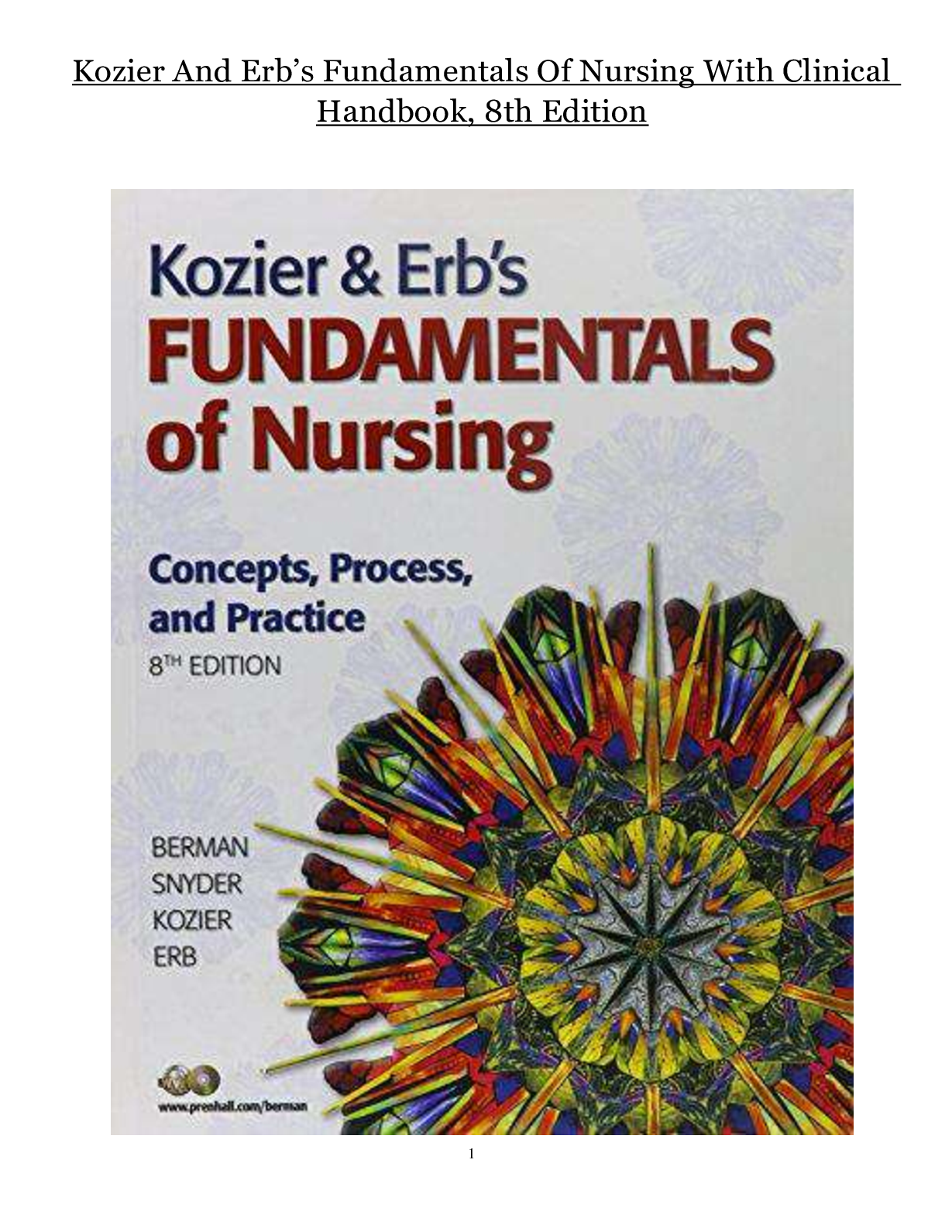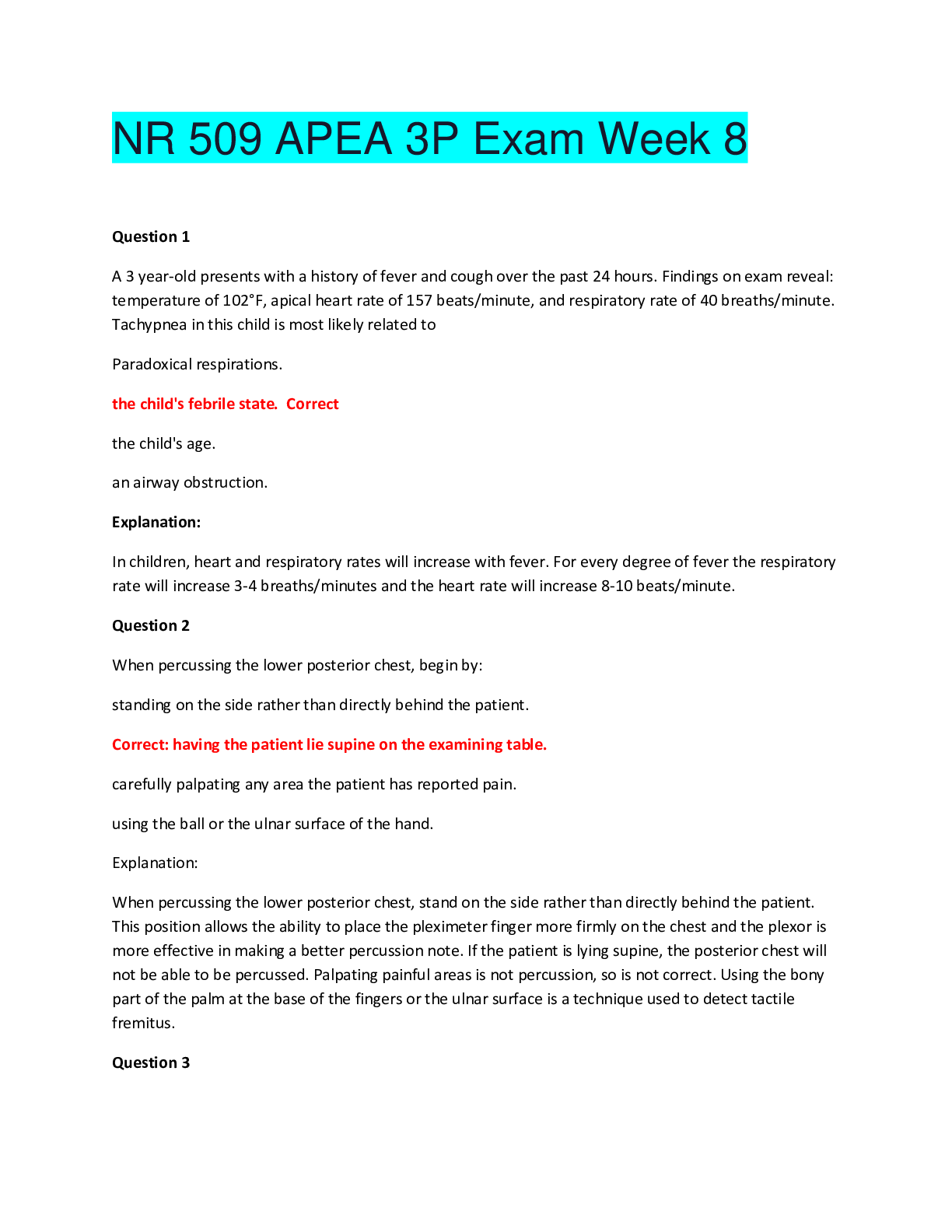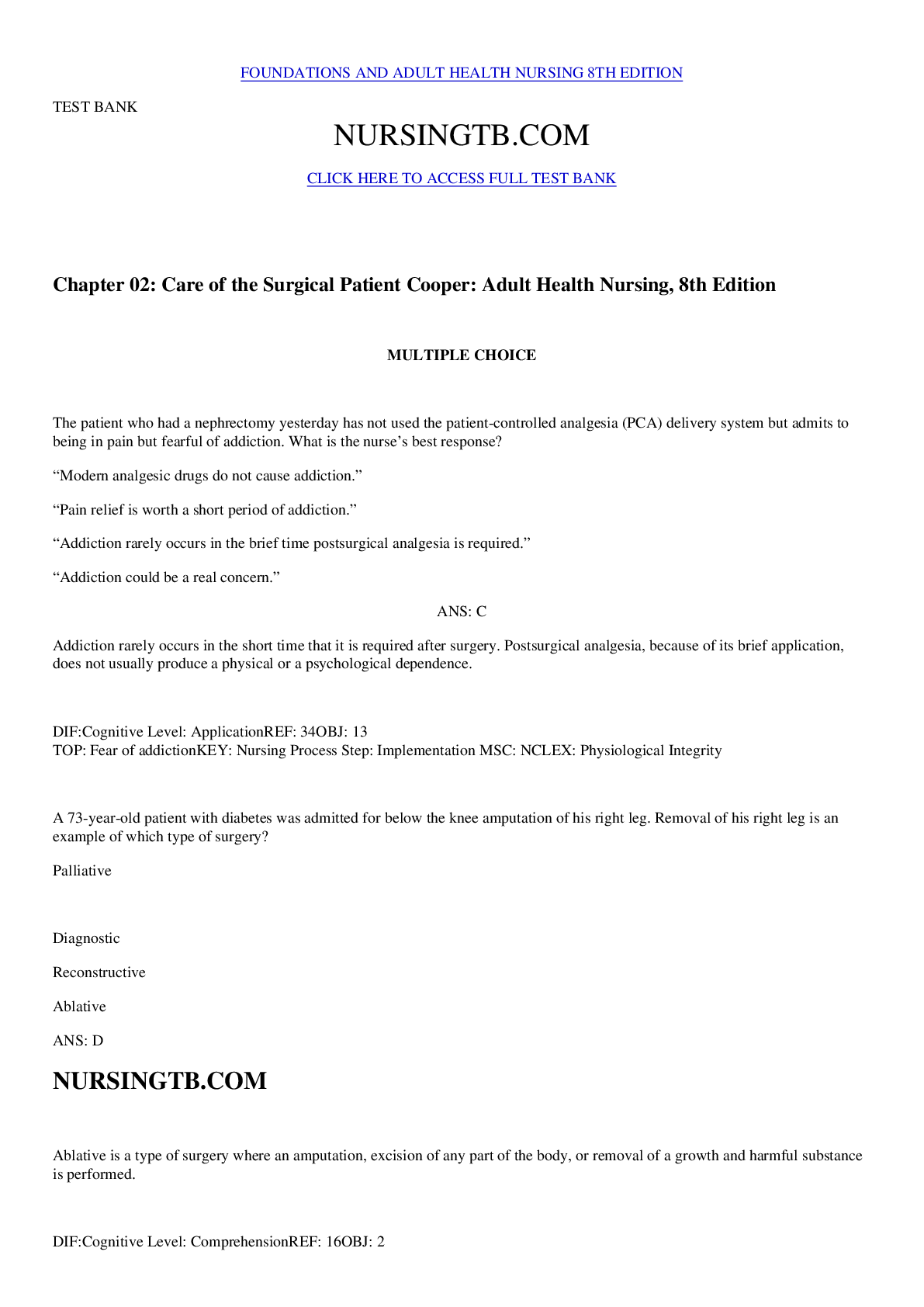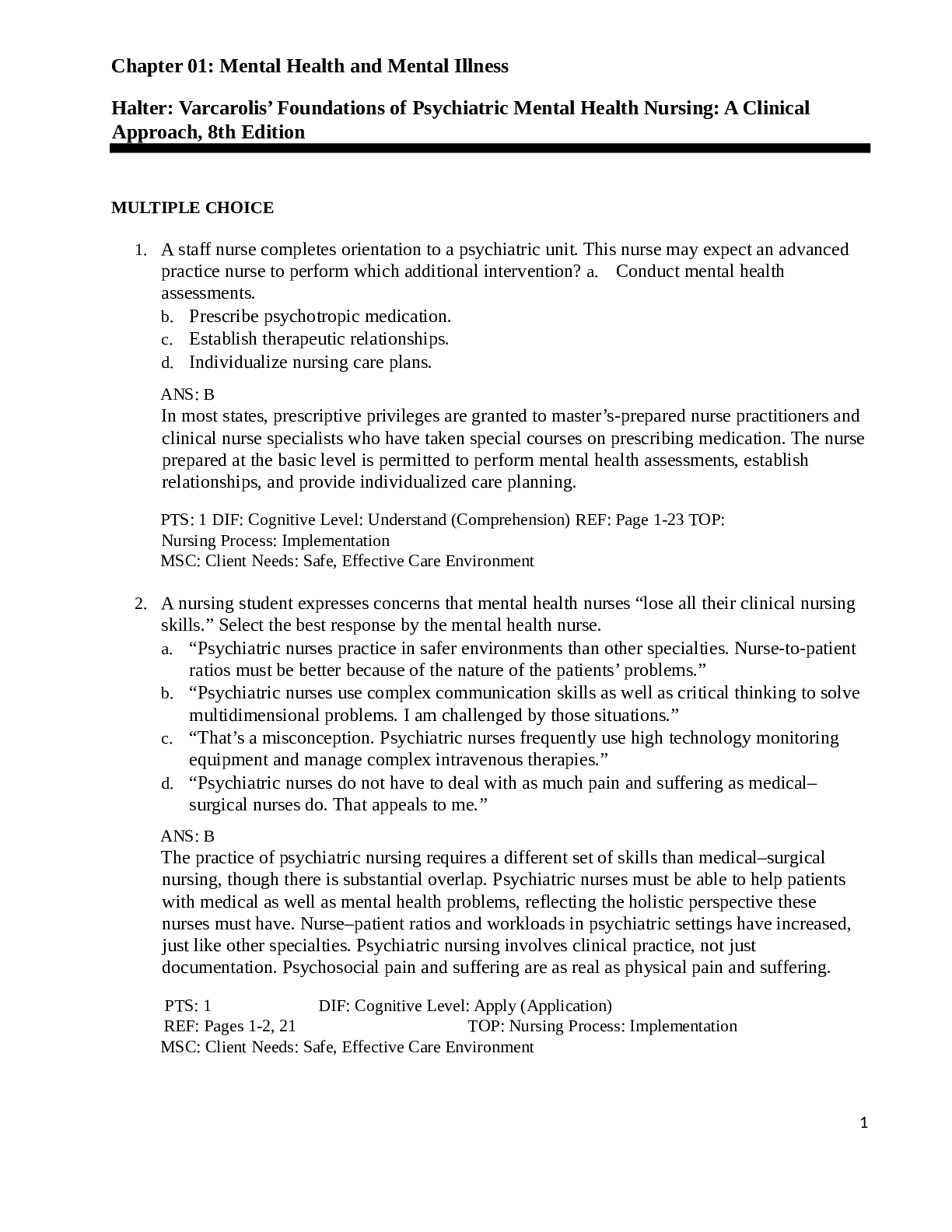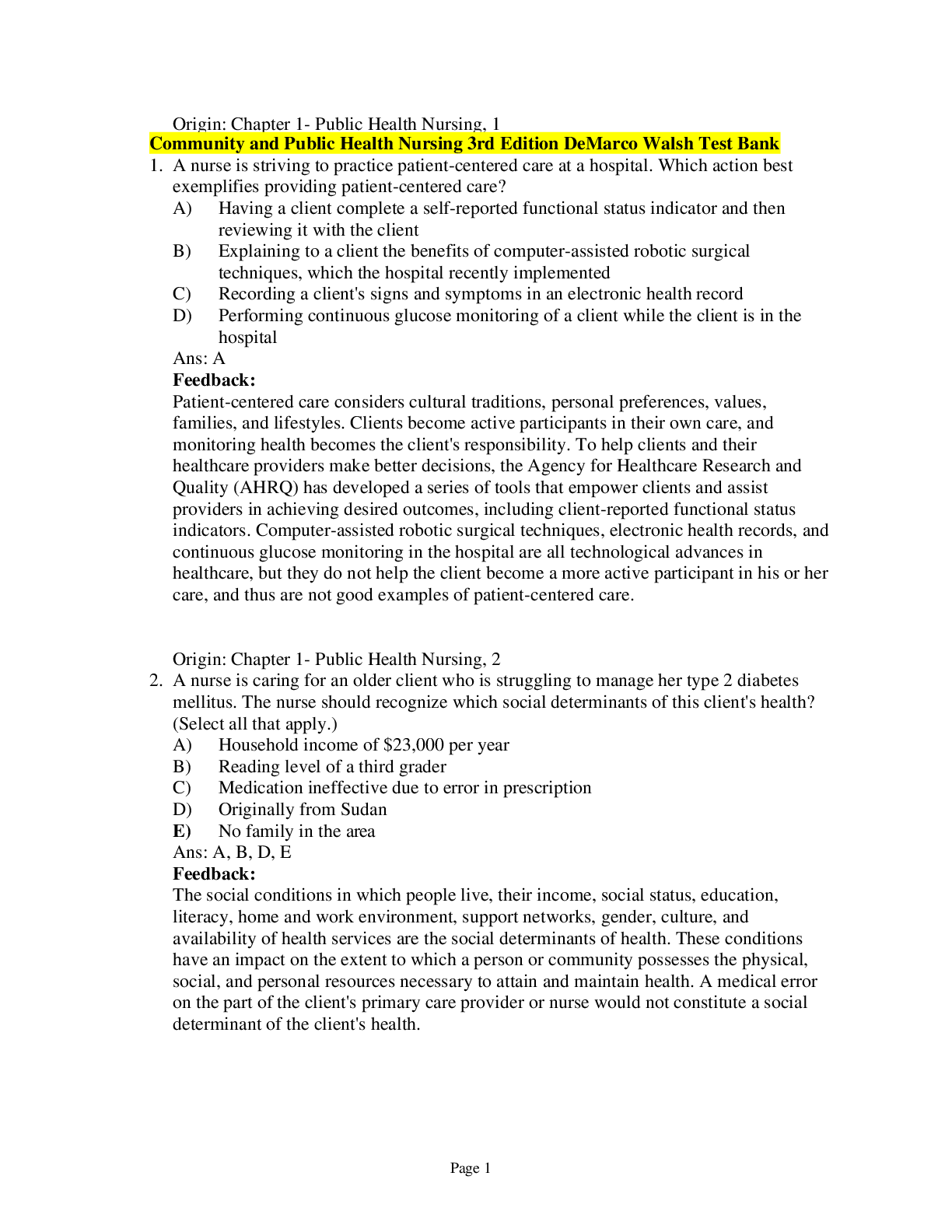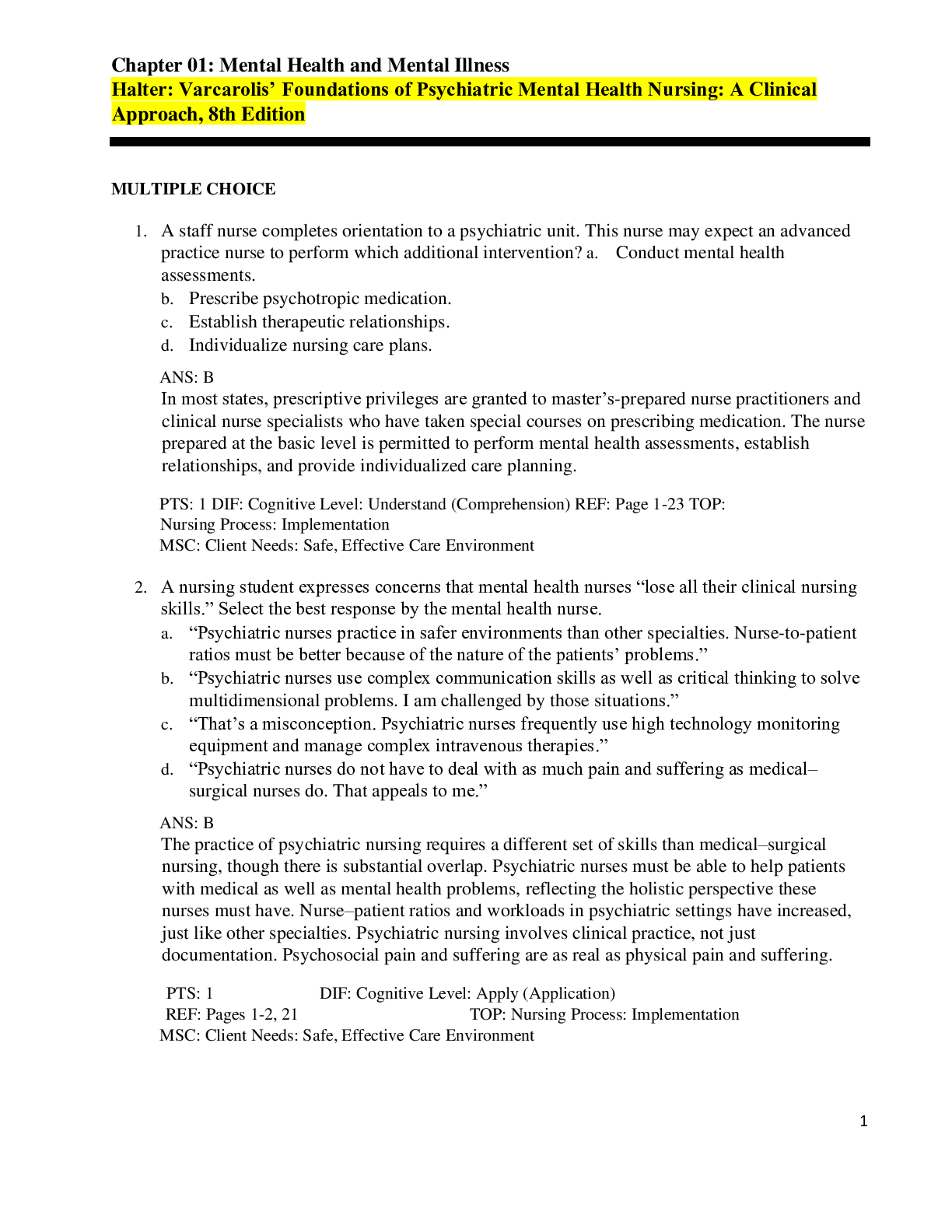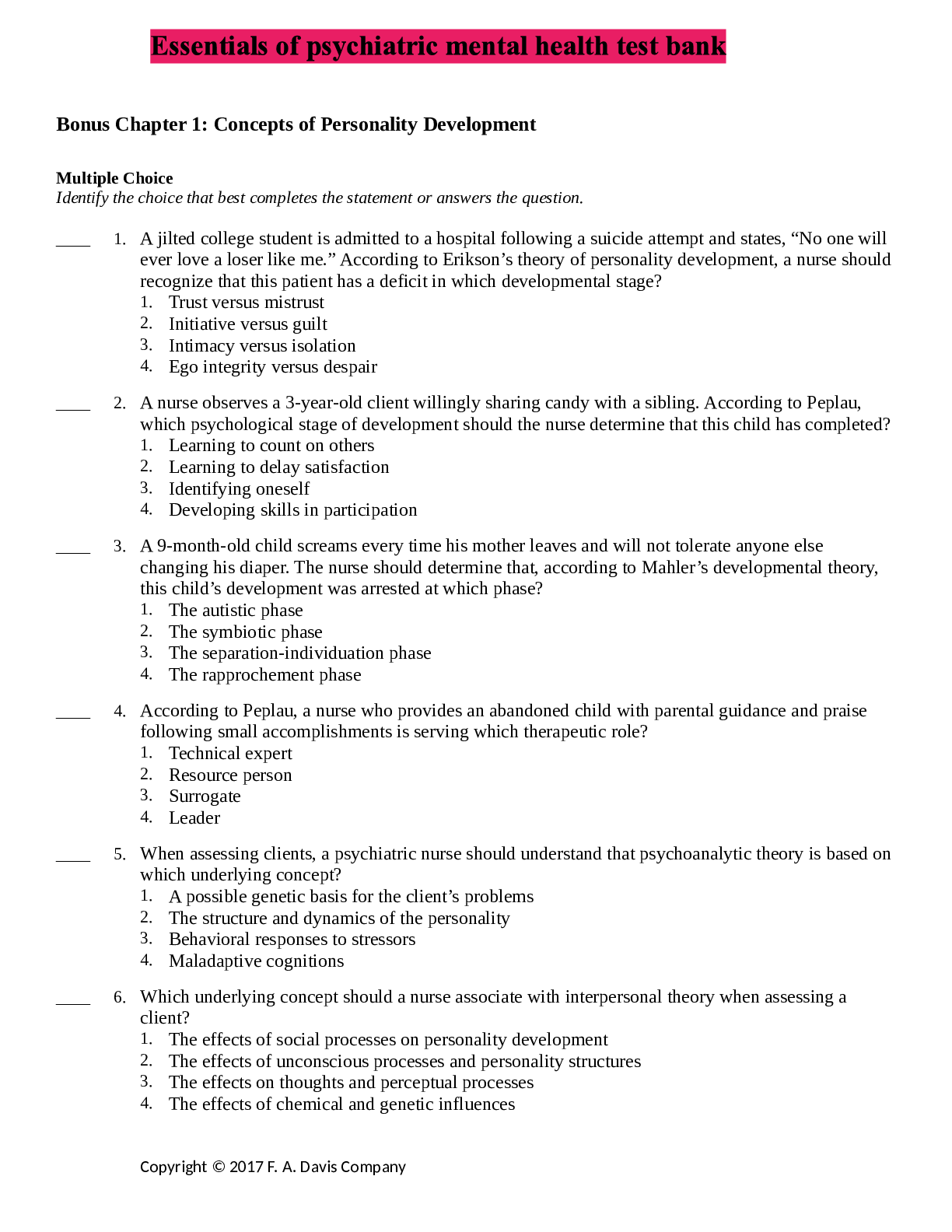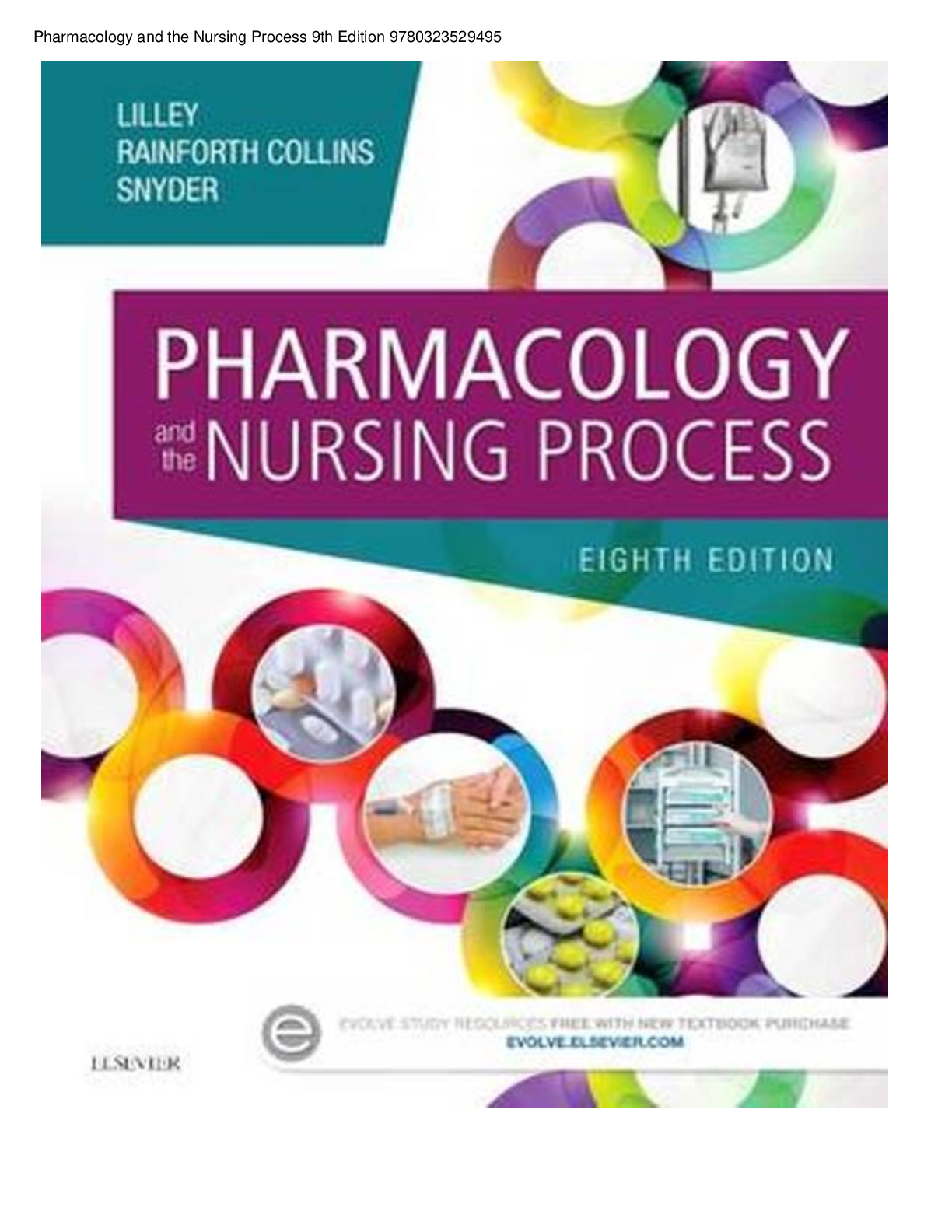*NURSING > TEST BANK > Varcarolis Essentials of Psychiatric Mental Health Nursing 3rd Edition_TEST BANK | Answers & Explana (All)
Varcarolis Essentials of Psychiatric Mental Health Nursing 3rd Edition_TEST BANK | Answers & Explanations (28 Chapters)_2022/2023
Document Content and Description Below
Varcarolis Essentials of Psychiatric Mental Health Nursing 3rd Edition Test Bank Table of Contents Table of Contents Chapter 01: Practicing the Science and the Art of Psychiatric Nursing Chapte... r 02: Mental Health and Mental Illness Chapter 03: Theories and Therapies Chapter 04: Biological Basis for Understanding Psychopharmacology Chapter 05: Settings for Psychiatric Care Chapter 06: Legal and Ethical Basis for Practice Chapter 07: Nursing Process and QSEN: The Foundation for Safe and Effective Care Chapter 08: Communication Skills: Medium for All Nursing Practice Chapter 09: Therapeutic Relationships and the Clinical Interview Chapter 10: Trauma and Stress-Related Disorders Chapter 11: Anxiety, Anxiety Disorders, and Obsessive-Compulsive Disorders Chapter 12: Somatic System Disorders and Dissociative Disorders Chapter 13: Personality Disorders Chapter 14: Eating Disorders Chapter 15: Mood Disorders: Depression Chapter 16: Bipolar Spectrum Disorders Chapter 17: Schizophrenia Spectrum Disorders and Other Psychotic Disorders Chapter 18: Neurocognitive Disorders Chapter 19: Substance-Related and Addictive Disorders Chapter 20: Crisis and Mass Disaster Chapter 21: Child, Partner, and Elder Violence Chapter 22: Sexual Violence Chapter 23: Suicidal Thoughts and Behavior Chapter 24: Anger, Aggression, and Violence Chapter 25: Care for the Dying and Those Who Grieve Chapter 26: Children and Adolescents Chapter 27: Adults Chapter 28: Older Adults Test Bank: Essentials of Psychiatric Mental Health Nursing (3rd Edition by Varcarolis) 1 Table of Contents Table of Contents 1 Chapter 01: Practicing the Science and the Art of Psychiatric Nursing 2 Chapter 02: Mental Health and Mental Il ness 7 Chapter 03: Theories and Therapies 12 Chapter 04: Biological Basis for Understanding Psychopharmacology 20 Chapter 05: Settings for Psychiatric Care 28 Chapter 06: Legal and Ethical Basis for Practice 35 Chapter 07: Nursing Process and QSEN: The Foundation for Safe and Effective Care 43 Chapter 08: Communication Skil s: Medium for Al Nursing Practice 51 Chapter 09: Therapeutic Relationships and the Clinical Interview 58 Chapter 10: Trauma and Stress-Related Disorders 67 Chapter 11: Anxiety, Anxiety Disorders, and Obsessive-Compulsive Disorders 74 Chapter 12: Somatic System Disorders and Dissociative Disorders 85 Chapter 13: Personality Disorders 94 Chapter 14: Eating Disorders 103 Chapter 15: Mood Disorders: Depression 111 Chapter 16: Bipolar Spectrum Disorders 121 Chapter 17: Schizophrenia Spectrum Disorders and Other Psychotic Disorders 131 Chapter 18: Neurocognitive Disorders 142 Chapter 19: Substance-Related and Addictive Disorders 151 Chapter 20: Crisis and Mass Disaster 163 Chapter 21: Child, Partner, and Elder Violence 171 Chapter 22: Sexual Violence 179 Chapter 23: Suicidal Thoughts and Behavior 186 Chapter 24: Anger, Aggression, and Violence 195 Chapter 25: Care for the Dying and Those Who Grieve 204 Chapter 26: Children and Adolescents 213 Chapter 27: Adults 221 Chapter 28: Older Adults 230 Test Bank: Essentials of Psychiatric Mental Health Nursing (3rd Edition by Varcarolis) 2 Chapter 01: Practicing the Science and the Art of Psychiatric Nursing MULTIPLE CHOICE 1. Which outcome, focused on recovery, would be expected in the plan of care for a patient living in the community and diagnosed with serious and persistent mental illness? Within 3 months, the patient will: a. deny suicidal ideation. b. report a sense of well-being. c. take medications as prescribed. d. attend clinic appointments on time. ANS: B Recovery emphasizes managing symptoms, reducing psychosocial disability, and improving role performance. The goal of recovery is to empower the individual with mental illness to achieve a sense of meaning and satisfaction in life and to function at the highest possible level of wellness. The incorrect options focus on the classic medical model rather than recovery. DIF: Cognitive Level: Application (Applying) REF: 2 TOP: Nursing Process: Outcomes Identification MSC: NCLEX: Health Promotion and Maintenance 2. In the shift-change report, an off-going nurse criticizes a patient who wears heavy makeup. Which comment by the nurse who receives the report best demonstrates advocacy? a. This is a psychiatric hospital. Craziness is what we are all about. b. Lets all show acceptance of this patient by wearing lots of makeup too. c. Your comments are inconsiderate and inappropriate. Keep the report objective. d. Our patients need our help to learn behaviors that will help them get along in society. ANS: D Accepting patients needs for self-expression and seeking to teach skills that will contribute to their well-being demonstrate respect and are important parts of advocacy. The on- coming nurse needs to take action to ensure that others are not prejudiced against the patient. Humor can be appropriate within the privacy of a shift report but not at the expense of respect for patients. Judging the off-going nurse in a critical way will create conflict. Nurses must show compassion for each other. DIF: Cognitive Level: Application (Applying) REF: 8 TOP: Nursing Process: Implementation MSC: NCLEX: Safe, Effective Care Environment 3. A nurse assesses a newly admitted patient diagnosed with major depressive disorder. Which statement is an example of attending? a. We all have stress in life. Being in a psychiatric hospital isnt the end of the world. b. Tell me why you felt you had to be hospitalized to receive treatment for your depression. c. You will feel better after we get some antidepressant medication started for you. d. Id like to sit with you a while so you may feel more comfortable talking with me. ANS: D Attending is a technique that demonstrates the nurses commitment to the relationship and reduces feelings of isolation. This technique shows respect for the patient and demonstrates caring. Generalizations, probing, and false reassurances are non-therapeutic. DIF: Cognitive Level: Application (Applying) REF: 8 TOP: Nursing Process: Implementation MSC: NCLEX: Psychosocial Integrity 4. A patient is hospitalized for depression and suicidal ideation after their spouse asks for a divorce. Select the nurses most caring comment. a. Lets discuss some means of coping other than suicide when you have these feelings. b. I understand why youre so depressed. When I got divorced, I was devastated too. c. You should forget about your marriage and move on with your life. d. How did you get so depressed that hospitalization was necessary? Test Bank: Essentials of Psychiatric Mental Health Nursing (3rd Edition by Varcarolis) 3 ANS: A The nurses communication should evidence caring and a commitment to work with the patient. This commitment lets the patient know the nurse will help. Probing and advice are not helpful or therapeutic interventions. DIF: Cognitive Level: Application (Applying) REF: 6 TOP: Nursing Process: Implementation MSC: NCLEX: Psychosocial Integrity 5. A patient shows the nurse an article from the Internet about a health problem. Which characteristic of the web sites address most alerts the nurse that the site may have biased and prejudiced information? a. Address ends in .org. b. Address ends in .com. c. Address ends in .gov. d. Address ends in .net. ANS: B Financial influences on a site are a clue that the information may be biased. .com at the end of the address indicates that the site is a commercial one. .gov indicates that the site is maintained by a government entity. .org indicates that the site is nonproprietary; the site may or may not have reliable information, but it does not profit from its activities. .net can have multiple meanings. DIF: Cognitive Level: Comprehension (Understanding) REF: 5 TOP: Nursing Process: Evaluation MSC: NCLEX: Health Promotion and Maintenance 6. A nurse says, When I was in school, I learned to call upset patients by name to get their attention; however, I read a descriptive research study that says that this approach does not work. I plan to stop calling patients by name. Which statement is the best appraisal of this nurses comment? a. One descriptive research study rarely provides enough evidence to change practice. b. Staff nurses apply new research findings only with the help from clinical nurse specialists. c. New research findings should be incorporated into clinical algorithms before using them in practice. [Show More]
Last updated: 1 year ago
Preview 1 out of 801 pages

Buy this document to get the full access instantly
Instant Download Access after purchase
Add to cartInstant download
We Accept:

Reviews( 0 )
$15.50
Document information
Connected school, study & course
About the document
Uploaded On
Sep 03, 2021
Number of pages
801
Written in
Additional information
This document has been written for:
Uploaded
Sep 03, 2021
Downloads
0
Views
109

